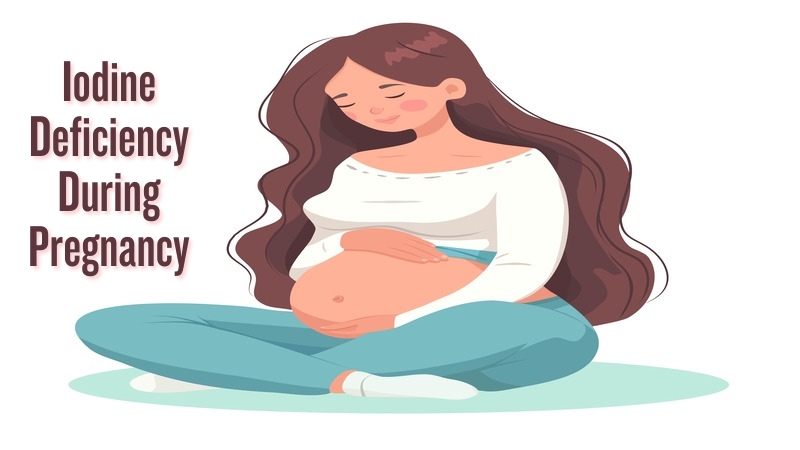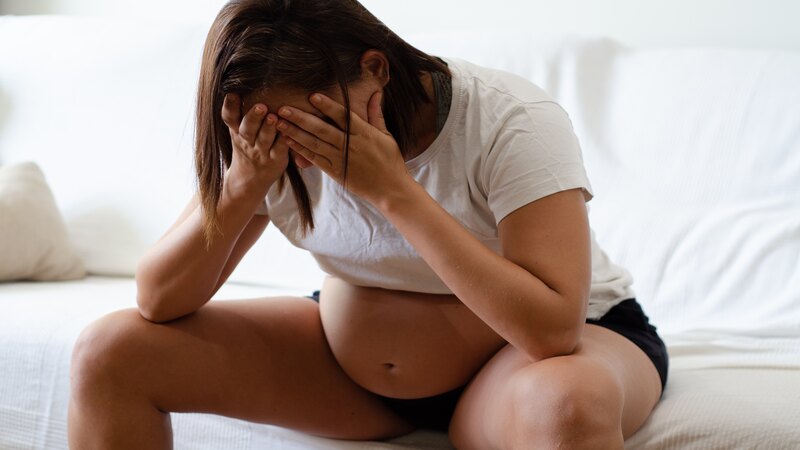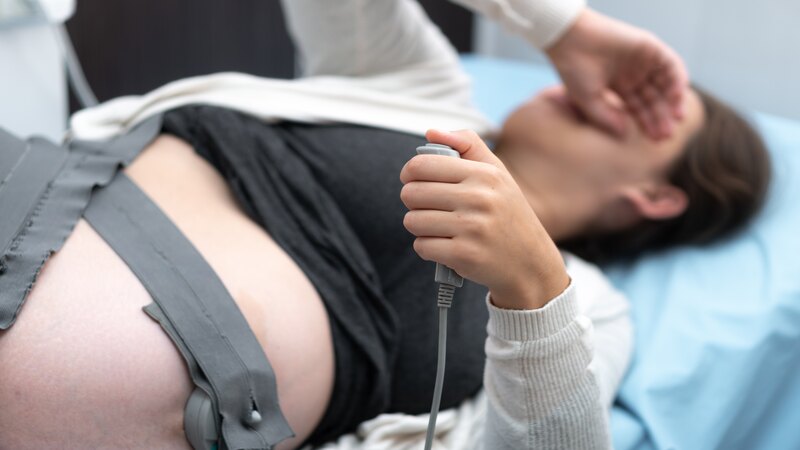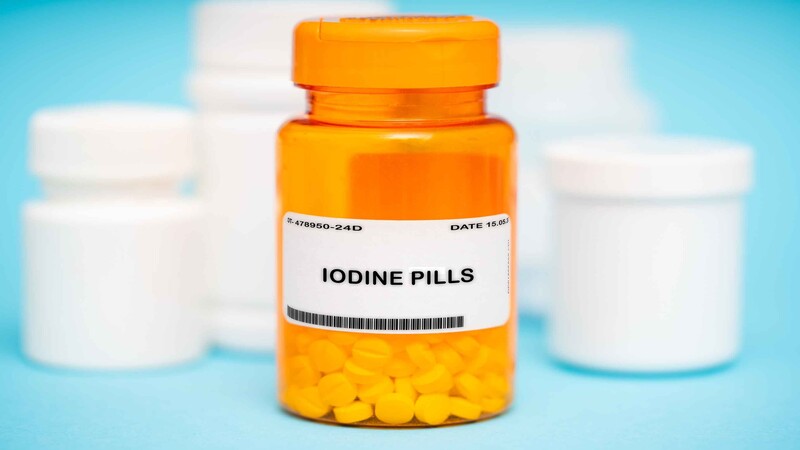 Minerals are micronutrients that our body requires for performing different tasks in the body. These minerals are an important part of our bones, and muscles, required for the normal functioning of our heart and brain. There are two types of minerals – Macro minerals and Micro minerals. Iodine is a mineral which is required in small amounts in the body. (1) Iodine is a mineral that is present in some foods.
Minerals are micronutrients that our body requires for performing different tasks in the body. These minerals are an important part of our bones, and muscles, required for the normal functioning of our heart and brain. There are two types of minerals – Macro minerals and Micro minerals. Iodine is a mineral which is required in small amounts in the body. (1) Iodine is a mineral that is present in some foods.
Our body requires iodine to make thyroid hormones. It is an important component of thyroid hormones thyroxine (T4) and triiodothyronine (T3). The thyroid gland can not function appropriately without the right amount of iodine (2)Thyroid hormones are responsible for the normal metabolism and other functions of the body. It is required for the normal development of the bone and brain of the baby during pregnancy (3).
What is Iodine?
Iodine is present in some foods and also available in fortified foods like salt. Iodine is found in soil. If the plant is grown in iodine-enriched soil, it may contain iodine in it. It depends upon the level of iodine in the soil. (4) A well-balanced diet involves a good amount of iodine, which helps your baby to develop a brain, which helps in increasing her learning and motor skills. Let us discuss this in detail about the iodine.
Importance of Iodine In Pregnancy

Thyroid hormones are ultimately needed for the development of the brain and nervous system of the fetus. If a mother does not have enough Iodine in her body, it may negatively affect the baby’s health, leading to issues such as infant mortality, intellectual impairment, and cretinism. (5)
How Much Iodine Does a Pregnant Woman Need?
The recommended dietary allowance for iodine is between 220 mcg and 290 mcg in pregnancy and 290 mcg when breastfeeding. (6) The American Thyroid Association emphasizes the importance of adequate iodine intake for women planning to become pregnant or who are already pregnant. Ensuring sufficient iodine in their diet before and during early pregnancy is crucial to prevent any negative effects on the baby’s development. (7)
Safe Sources Of Iodine For Pregnant Women
It is essential to manage iodine levels in your pregnancy diet, regardless of whether you have an iodine deficiency. Seafood, eggs, and some dairy products are good sources of iodine for pregnant women. (8) Here are some top 10 iodine-rich foods that can help you meet the daily optimal requirements (9).
Side Effects of Iodine Deficiency During Pregnancy

The baby is dependent upon the mother for thyroid hormones. If the pregnant mother does not have enough iodine stored in her body, then the baby may suffer from irreversible changes in the development process. (5)
Insufficient intake of iodine increases the risk of :
- Infant mortality,
- mental retardation
- Low Intellectual level
- Stunted growth
- Development delays
Severe iodine deficiency during pregnancy can lead to brain damage known as cretinism, or congenital iodine deficiency syndrome.
Babies who are born with this condition suffer from complications, including (5) :
- Physical and mental growth retardation
- Deaf mutism
- Short stature
Signs And Symptoms of Iodine Deficiency During Pregnancy

The main symptom that occurs after iodine deficiency is hypothyroidism. It occurs when iodine levels decrease to the level where the thyroid gland cannot make thyroid hormones for the normal functioning of the body. This condition results in the body causing other symptoms.
The following symptoms may occur during pregnancy with iodine deficiency:
- Severe tiredness and muscle weakness
- Unnecessary weight gain
- Choking
- Depression
- Puffiness of the skin
- Dry skin
- Intolerance to cold
- Hair loss
- Constipation
- Enlarged thyroid or goiter
Risk Factors That Can Cause Iodine Deficiency During Pregnancy
During the early days of pregnancy, the fetus is dependent on the mother for thyroid hormones. Insufficient iodine during pregnancy may lead to severe complications such as miscarriage, stillbirths, and birth defects.
Iodine deficiency during pregnancy can cause stunted growth of the baby, mental retardation, and developmental delays. Severe Iodine deficiency can lead to brain damage called cretinism, which may lead to other complications like physical and mental delays, inability to speak short stature, etc. (10)
Conditions Associated With Iodine Deficiency During Pregnancy

As iodine deficiency is becoming very common these days, It is very important to get your thyroid checked before conception and during pregnancy as well.
Maternal iodine deficiency leads to severe complications during pregnancy, such as (11):
- Miscarriage
- Prematurity
- Stillbirth
- Low birth weight of the baby
- Impaired neurodevelopment
- Low IQ
Diagnosing Iodine Deficiency During Pregnancy
The doctor will do a physical examination as well as recommend some blood and urine tests. If the blood test reports are abnormal, like abnormal levels of TSH, then he will suggest further ultrasound for a thyroid gland checkup. If you are diagnosed with iodine deficiency or hypothyroidism, he will refer you to an endocrinologist for further treatment. (12)
Treatment Options For Iodine Deficiency During Pregnancy

When a pregnant female is diagnosed with iodine deficiency, she is advised to take thyroid medicine. Doctors may recommend thyroid hormone supplements (9). She may take iodized fortified foods and should avoid foods that may interfere with the uptake of iodine.
Preventive Measures to Avoid Iodine Deficiency During Pregnancy
It is essential to ensure adequate iodine intake during pregnancy, as it is a crucial mineral that impacts both the metabolism and growth of the baby. Here are some preventive measures you should take during pregnancy to avoid iodine deficiency. (13) (14)
- Use of salt which is fortified with iodine
- Use food products that are fortified with iodine, such as cereals, breads, etc.
- One can use iodinated water
- By using iodine supplements or tablets
- Include dairy products, eggs, fish, meats, seafood, and nuts.
When To Consult A Doctor?

It is better to consult your doctor as soon as possible when you are pregnant. Your doctor will suggest you take a blood test and check your thyroid hormone levels. The doctor will suggest or adjust the thyroid supplement dosage according to the requirement.
Iodine is a very important mineral for the normal thyroid functioning in the body but its deficiency is also becoming very common these days. It is not only important for our body for day-to-day function But its requirement increases during pregnancy. Insufficient levels of iodine in the mother’s body during pregnancy may lead to irreversible changes in the mental and skeletal development of the fetus. It is advised to always consult your doctor before conception as well as during pregnancy.
FAQ’s
1. What Happens If You Don’t Take Iodine During Pregnancy?
Iodine deficiency may lead to irreversible changes in the fetus. Low levels of iodine during pregnancy lead to stillbirth, miscarriages, preterm delivery, or sometimes, in severe cases, cretinism.
2. How Can I Increase My Iodine Levels During Pregnancy?
Consider taking iodine supplements or thyroid medication as recommended by doctors. Additionally, include iodine-rich foods like eggs, fish, fortified cereals, and iodized salt in your diet.
3. How Does Thyroid Affect The Baby During Pregnancy?
You need more iodine during pregnancy. Deficiency of iodine or hypothyroidism may lead to irreversible effects on the fetus. Studies have shown that babies born to mothers with low levels of iodine have low IQ levels and impaired mental and skeletal development.
4. In Which Trimester Is Iodine Most Important?
Iodine is important in all the trimesters before pregnancy and during pregnancy. Low levels of iodine before pregnancy make it difficult to conceive, while deficiency during pregnancy may cause irreversible changes in the development of the fetus.
Reference
- Medline Plus, Minerals – https://medlineplus.gov/minerals.html
- National Institute Of Health, Office Of Dietary Supplement, Iodine – https://ods.od.nih.gov/factsheets/Iodine-HealthProfessional/
- Department of Health, Victoria State Government – https://www.betterhealth.vic.gov.au/health/healthyliving/iodine
- NHS, Vitamins and minerals, Iodine – https://www.nhs.uk/conditions/vitamins-and-minerals/iodine/
- Ian Darnton-Hill, AO Tufts University, USA University of Sydney, Australia, July 2017 – https://www.who.int/tools/elena/bbc/iodine-pregnancy
- Brentwood (TN): Organization of Teratology Information Specialists (OTIS); 1994-. Iodine – https://www.ncbi.nlm.nih.gov/books/NBK582771/
- CLINICAL THYROIDOLOGY FOR THE PUBLIC, A publication of the American Thyroid Association – https://www.thyroid.org/patient-thyroid-information/ct-for-patients/february-2019/vol-12-issue-2-p-5-6/
- Nutricia Australia Pty Limited, The importance of iodine in pregnancy – https://nutricia.com.au/aptamil/parents-and-carers/pregnancy/the-importance-of-iodine-in-pregnancy/
- Cleveland Clinic, Iodine Deficiency – https://my.clevelandclinic.org/health/diseases/23417-iodine-deficiency#diagnosis-and-tests
- Creswell J Eastman, M.D. Professor of Medicine, Sydney Medical School, the University of Sydney;
Michael B Zimmermann, M.D. Professor of Human Nutrition, Swiss Federal Institute of Technology (ETH) Zurich – https://www.ncbi.nlm.nih.gov/books/NBK285556/ - Consequences of Iodine Deficiency in Pregnancy – https://www.frontiersin.org/research-topics/11941/consequences-of-iodine-deficiency-in-pregnancy
- Health Direct, Iodine deficiency – https://www.healthdirect.gov.au/iodine-deficiency
- Institute of Medicine (US) Committee on Micronutrient Deficiencies; Howson CP, Kennedy ET, Horwitz A, editors. Prevention of Micronutrient Deficiencies: Tools for Policymakers and Public Health Workers. Washington (DC): National Academies Press (US); 1998. 5, Prevention of Iodine Deficiency – https://www.ncbi.nlm.nih.gov/books/NBK230108/
- Temple Health, Iodine Deficiency – https://www.templehealth.org/services/conditions/iodine-deficiency/

